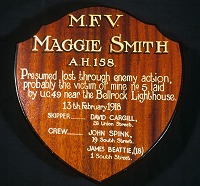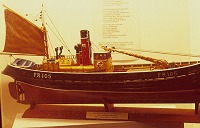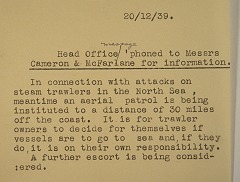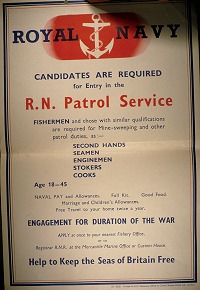Back to start | Back to World Wars (i) | Back to World Wars (ii)
The World Wars
The First World War
By 1914 there were 32,678 Scottish fishermen. Many of them worked on the East Coast. When the First World War started in August 1914, fishermen were immediately in the front line. Germany was the main British enemy. German submarines would surface alongside a fishing boat. International law said that submarines should surface and order the crew of a fishing boat or merchant ship to leave, before sinking the craft by gunfire. Submarines were not allowed to torpedo merchant vessels. However in 1915 Germany warned that they would sink any British ship on sight, without warning.

German vessels also laid mines to blow up British ships. In February 1918 the Arbroath fishing boat Maggie Smith hit a mine while sailing to fish off the Bell Rock. The boat and all her crew were lost. It is believed that the German submarine UC49 laid the mine.
When the war began in 1914, the Admiralty, the Board that controlled the Royal Navy, took control of all British shipping. That included fishing boats. The Admiralty told fishing boats not to enter ports at night, and said that fishing was not allowed at certain places on the coast. Fishing boats had to make sure that they had registration letters and numbers painted on, or the Royal Navy could fire at them.
The Royal Navy commandeered around 3000 fishing boats during the war. About half were steam drifters. These vessels were used as moorings for barrage balloons, flit boats, boom defence, minesweeping, or patrolling for boom defence, as convoy escorts and for minesweeping and anti-submarine patrols. The Navy was so impressed with the drifters that they had their own built. They modelled their 'Admiralty Drifters' on Ocean Reward, a drifter built by Alexander Hall of Aberdeen in 1912.

Some of the fishermen were very brave. Skipper Joseph Watt won the Victoria Cross when his fishing boat Gowanlea FR105 led a formation of drifters and fought against three Austrian cruisers. The encounter occurred in the Adriatic while the boat was on duty with a fleet of minesweepers. The cruisers demanded that the 35-ton fishing boat surrender but the skipper refused and gave the order to fire, using the 6-pound gun on board. The gunner, Fred Hawley Lamb continued to fire despite having his leg severely injured by an enemy shell. The drifters were outgunned but refused to flee or surrender. They held the Austrians until the Royal Navy arrived. During the war the enemy sank 675 British fishing boats and killed 1127 fishermen.
The fishermen who continued to fish also played an important part in the war effort. German submarines sank large numbers of British merchant ships carrying food to Britain. The idea was to starve Britain into surrender. Fishermen were more important than ever as they brought food into the country. They had to work longer hours to bring home more fish.
Even when the war was won there was danger from floating mines. Some fishermen were given rifles to use to blow mines up. Fishing families were also affected. The widows and children of fishermen often needed extra help after the war.
The Second World War

The Second World War began in September 1939. As well as submarines and mines, German aircraft could also attack fishing boats. At the beginning of the war the Royal Air Force patrolled 30 miles out to sea to protect fishing boats.
There was also fear of an invasion so that in 1940 the government issued an Immobilisation of Vehicle Order. If fishermen left their boat in harbour, they had to ensure that the enemy could not use it. Fishermen had to take vital parts from the engine of motor or steam boats. They were also to remove oars, rudders and masts from sailing and rowing boats.

About 10,000 Scottish fishermen joined the Royal or the Merchant Navy during the war. Many served in their own boats or in other commandeered fishing vessels. As in the First World War they provided escorts and hunted for mines and submarines. Fishing boat skippers earned £4 8s 8d (£4.44) a week as Temporary Skippers (Royal Naval Reserve.)
Life was difficult for those fishermen who continued to fish. They faced petrol rationing and restrictions on fishing grounds. Fishing was banned in the Firth of Forth and fishing boats were not allowed near Rosyth naval base. All fishing boats needed a permit before they went to sea. The use of radios was banned in case the enemy intercepted the messages. However fishermen could use the radio to warn the Navy if they saw German aircraft or submarines. If a trawler were sunk, the crew would receive a month's wage. The Germans attacked about 200 Scottish fishing boats during the war, sinking 29.
Sometimes the fishermen could fight back. In the early part of the war there were not many weapons to spare. The army and navy got the best weapons and fishermen had to make do with what was left. If German aircraft attacked a fishing boat, the Admiralty suggested that fishermen could fight back with a gun that fired grenades, or a rocket that fired a parachute. More practical was the advice for fishing boats with machine guns to stay together as the fire from several craft was a more effective deterrent than the fire from a single gun.

Even the clothes that fishermen wore were rationed, although the deep-water fishermen were allowed more clothes than workers on land. Sometimes the government would borrow motor fishing boats for a few months. These boats would be used for commando operations, or for large events such as the Invasion of Normandy. The local Fishery Officer had to select the boats whose use would cause the least hardship to the owners and least effect fish supply to the country.
Overall, the fishing industry was invaluable in time of war. As well as supplying food, they rescued shot-down airmen, provided thousands of expert seamen and hundreds of useful boats. In doing so, though they suffered numerous casualties and some hardship, fishermen undoubtedly helped win Britain's wars.
Back to start | Back to World Wars (i) | Back to World Wars (ii)